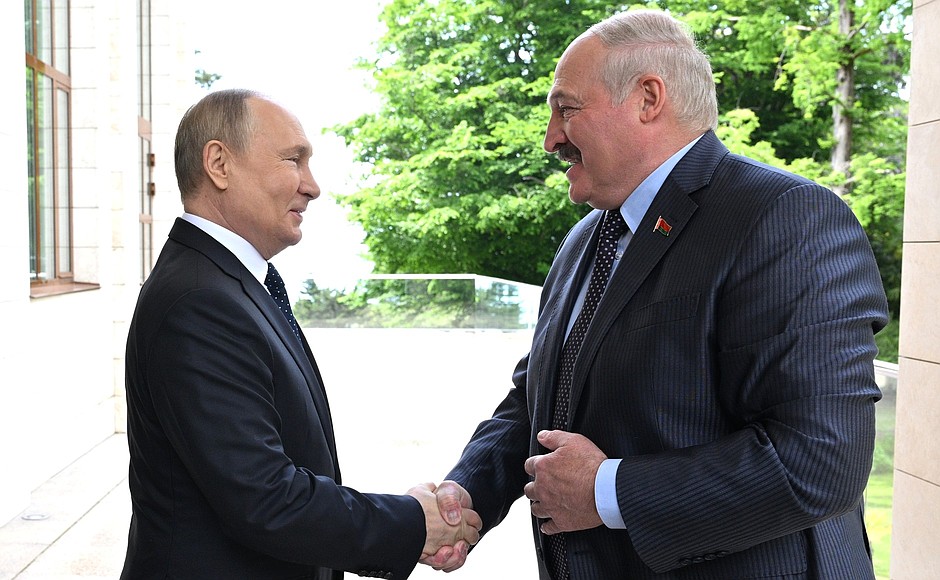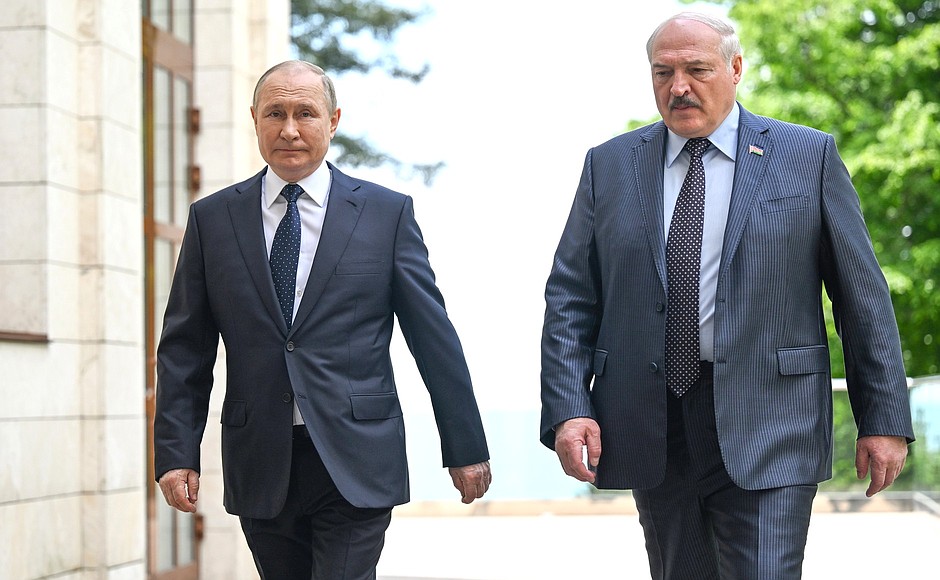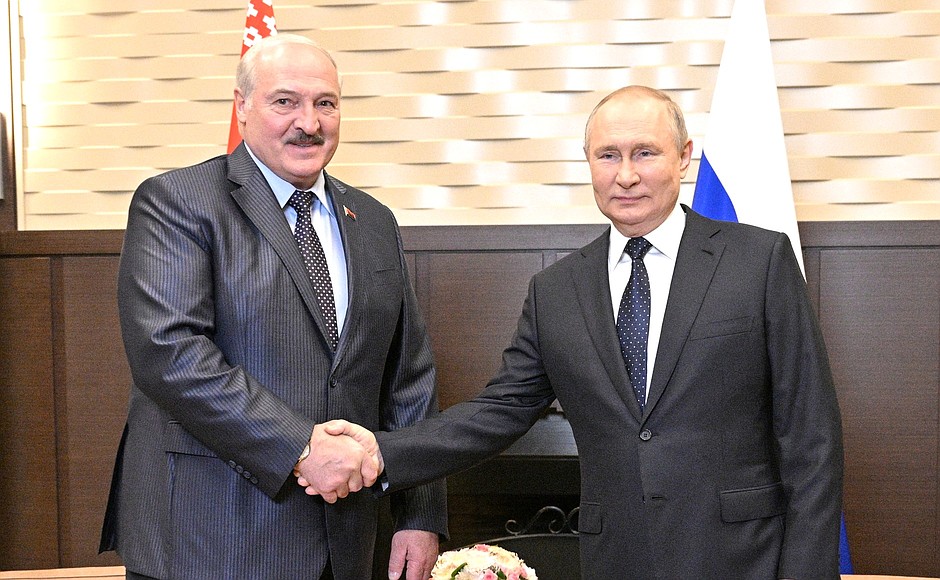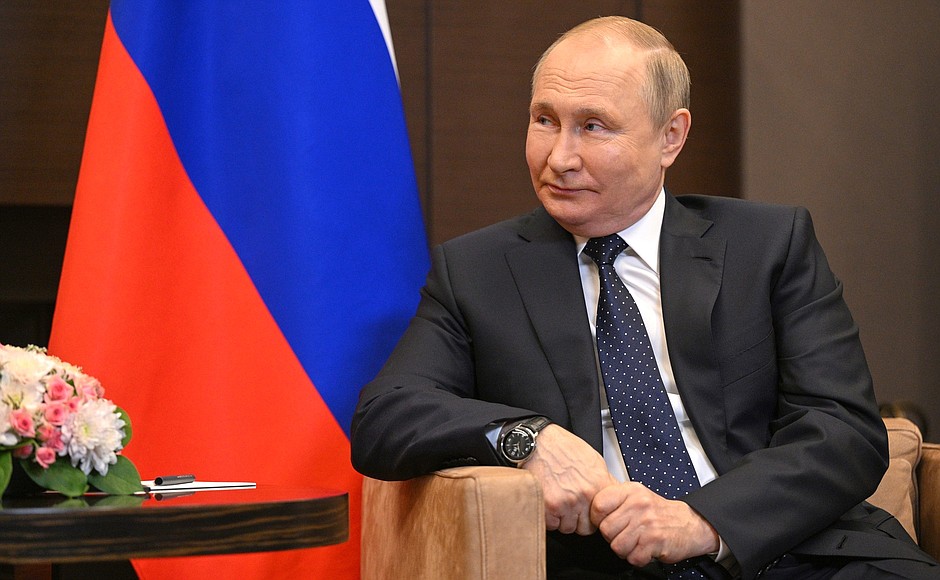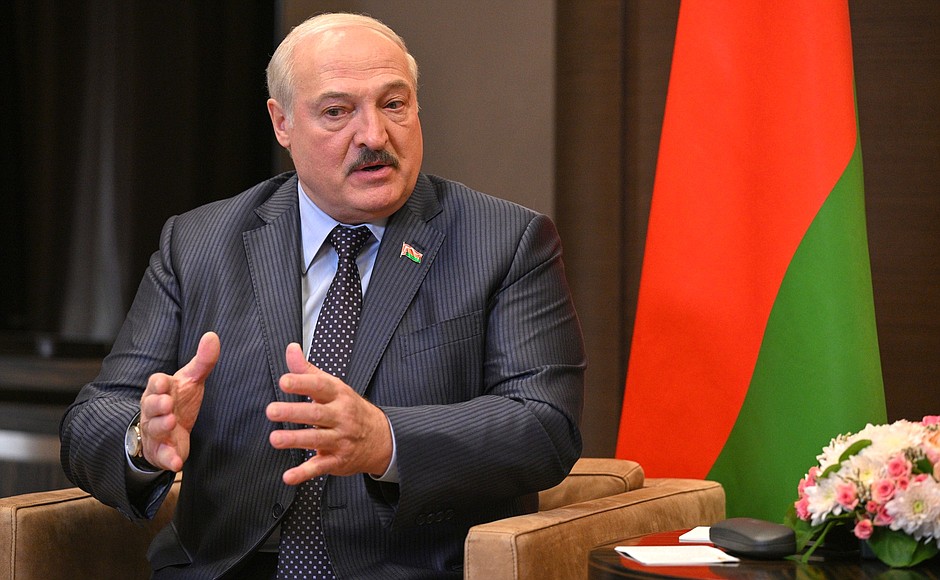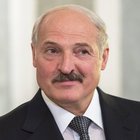Beginning of Russian-Belarusian talks
President of Russia Vladimir Putin: Mr Lukashenko,
You and I met in Moscow not so long ago and agreed to hold a separate meeting here in Sochi because, indeed, the circumstances call for a serious and profound conversation. I mean everything linked with regional security issues, the security of our countries and also those linked with the economy.
Despite all the difficulties, I would like to note that the Russian economy is withstanding the sanctions blow quite well, as evidenced by all the key macroeconomic indicators. I will not list them now, but I will tell you what is going on during our conversation.
Yes, of course, things are not so easy, and everything that is happening requires special attention and special efforts from the Government’s economic bloc. On the whole, I would like to note that these efforts are having a positive impact. This is reflected in trade volumes between our countries. Last year, we hit an all-time high – almost US$38.5 billion. Incidentally, the conversion to national currency / ruble payments in trade with our partners is also making itself felt. You have repeatedly noted the need to do this in the past.
The situation has objectively developed in a way that we have done this – and in general, this was not detrimental to our partners, as we are meeting all our obligations. We are converting to national currency / ruble payments in trading in certain commodity categories, and this helps strengthen the ruble. Russia and Belarus see nothing new here, we have been trading in national currencies for a long time, and these volumes are expanding.
Of course, another key issue – and everyone is probably expecting me to say ‘energy’ – true, it is important, but industrial cooperation comes first. You have also repeatedly raised the issue of taking additional steps forward here.
President of the Republic of Belarus Alexander Lukashenko: In terms of cooperation.
President of Russia Vladimir Putin: In terms of industrial cooperation.
Naturally, this involves energy and agriculture as a whole. We have very many spheres of joint work, and we have a lot to discuss. I am not talking about subsequent processes linked with building the Union State. As agreed, we are doing everything calmly, and we are coordinating every step, so that each step will make us and our political systems stronger, both inside and outside, creating a fundamental, proper and solid basis for economic development.
I am delighted to see you, welcome.
Alexander Lukashenko: Thank you very much. This is not a tribute to fashion. I am really grateful to you for this opportunity to have a dip in the sea and to meet with you and discuss urgent issues.
You know, this is a very important point. You noted once that the economy in Russia and in general in our union [the Union State] is not merely getting stronger – unexpectedly, its growth is becoming intensive – take inflation that is less than expected or take unemployment that is going down.
Vladimir Putin: Lower than expected.
Alexander Lukashenko: This is good. The ruble is getting stronger at a crazy rate. We should not overdo here. Hence, there are many surprises but these are surprises for them. We expected them. This is a time of opportunities. Unaware of this, the Western countries prompted us to work more intensively on our economy.
We identified, that is, our governments identified on our instruction, the main import substitution areas. They even calculated very tentatively, what the costs might be. This is not a lot. I do not want to voice these figures in public because they are approximate but they are peanuts. But we will achieve good import substitution in the main areas where we are short of spare parts and so on.
I am not even talking about security. We are doing a good job in the sphere of security in terms of producing what our joint army, the army that is operating here needs.
So, we should thank them for giving us an impetus to develop our own economy. We have an enormous market and we have resources and technology. And what is happening with them? They have obviously underestimated this. They have been living reading their media and they got inflation and other things. “Putin is to blame,” they say. They are blaming Putin for everything.
Vladimir Putin: We are going to have a serious talk with him.
Alexander Lukashenko: Yes. (Laughing.) That’s why we are doing well here. We did the right thing when we agreed in Moscow to have a separate meeting to discuss a package of import substitution issues and areas and security. We did not conceal we had things to discuss, especially now that NATO is concentrating its troops on the Western borders.
There are some interesting surprises in Ukraine, as you know very well. We are concerned, and I believe you are too, over the steps politicians are already taking to split Ukraine. We are worried that they are prepared – the Poles and NATO – to take away Western Ukraine, as it was before 1939. But we are worried not only over security but also because this is strategy for Western Belarus. Therefore, we are keeping our eyes open, and, as I have already said, the Ukrainians will still have to ask us to prevent the western and other parts of Ukraine from being separated. This is my position but you certainly know it. I know this.
Therefore, we have many problems in this context but they are not exactly our problems – they are their problems that we will have to resolve. Take, for example, President Duda’s incomprehensible conduct yesterday in Kiev. By the way, he decides practically nothing in Poland but just comes up with these fakes.
Therefore, in terms of security we have many problems. You are right here, and I support you. But we will resolve them. We are not afraid of anything. As we used to say in old times, our cause is just and we will win anyway, no matter what.
Thank you once again for the opportunity to discuss these issues in more detail and to monitor the fulfilment of the commitments and instructions that we gave to our governments.
Vladimir Putin: I am very glad to see you.
<…>
